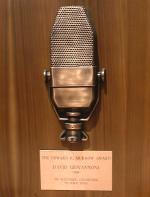
Edward R. Murrow Award, CPB
For Outstanding Contributions To Public Radio. April 11, 1994.
Remarks of David Giovannoni.
Public radio is the best radio.
Speaking as a listener and member, I must tell you that public radio is also an important part of my life. As a professional I consider myself fortunate to be a part of it. Yet I've worked here long enough to know some of you may be asking this question:
What would Murrow have thought of this honor going to someone who does audience research?
To answer this, we should recall what public radio does for the public, and what audience research does for public radio.
Every day, public radio realizes the principles for which Murrow stood. Quality. Integrity. Intelligence with a conscience. Through our programming we seek the truth and convey the experience.
Like Murrow, we share the ideal of service to our subjects; we treat our topics, our guests, our sources, our music with the respect and depth that they deserve. We also share his ideal of service to the public. Our work is nothing if not a public service. And to provide a public service, we must deliver significant programming to significant audiences.
We judge the significance of our programming in terms of our values; we call it our mission. We assess the significance of the audience through various means of research. We've come to understand that mission and research aren't mutually-exclusive because mission and audience aren't mutually-exclusive. Indeed, mission and audience define public service. Both are necessary; neither is sufficient.
Like Murrow, we realize the power of radio. But we strike a deal with the devil to gain this power. In payment for a golden bullhorn and bully pulpit, the broadcaster is left both blind and deaf. We can't see those we touch with our words and music. We can't hear the sighs that our news evokes or the laughter at our wit and humor.
Audience research gives us the eyes to see and the ears to hear. We can see where our words fall, and we can hear their echoes. It consummates the human act of communication. Without it, we're just talking to ourselves.
Research may serve as our eyes and ears, but it's no substitute for brains or inspiration. You establish the topic. You tell the story. You make the program. Your talent, your creativity, and your energy keep our industry vital. But our public demands the best, and some things just work better than others. Those who refuse to consider the audience shun the spirit of public radio. In refusing to open their eyes and ears, they rebuke the ideal of service
– the bedrock upon which our character and Edward R. Murrow's legacy are founded.When I got into this business, there were many who feared that audience research would cause us to pander
– to reach low to reach large. I've been doing research for 15 years now and I'm convinced – research doesn't cause us to pander; but our sources of funding might. Commercial support encourages pandering to advertisers. Institutional support encourages pandering to bureaucracies. Tax-based support encourages pandering to politicians and special-interests. But listener support forces us to serve listeners.Murrow worried about the sponsor's influence over programming. We should worry too. Because in public radio the sponsor is the listener. If we don't serve listeners with programming of the highest quality
– and if our programming isn't important to the people who hear it – it's not a public service, no matter how creative, intelligent, or important we may think it to be.The listener is the judge of our words, and words that aren't heard can't be considered. If no one had heard Murrow's reports from London in the comfort of their battle-spared homes; if no one had seen his Harvest of Shame while snacking on the spoils of their Thanksgiving; if no one had listened when he reproached the junior senator from Wisconsin; if Murrow's voice had stopped at this microphone, he would have changed no minds, had no impact, and left us no standard to which to aspire.
In short, ratings haven't corrupted public radio
– if anything, public radio has redeemed the ratings. We've accepted them as the objective listener feedback they are. We've turned them from tools for advertisers into means of assessing listener satisfaction, and in the process we've freed ourselves from their tyranny.In my professional lifetime, I've seen public radio grow from a seedling in our sandbox to the national treasure it is today. Public radio does make a difference. Today it's more important in more people's lives than ever. Millions of Americans depend on it. They would miss it deeply if it went away. And I'm one of them.
If the Murrow award recognizes the responsible and imaginative use of radio, there isn't a person in this room who doesn't earn it every day. Many more people deserve this honor than can ever receive it.
You make public radio the best radio. If this generous honor came from anywhere else it would not mean nearly as much.